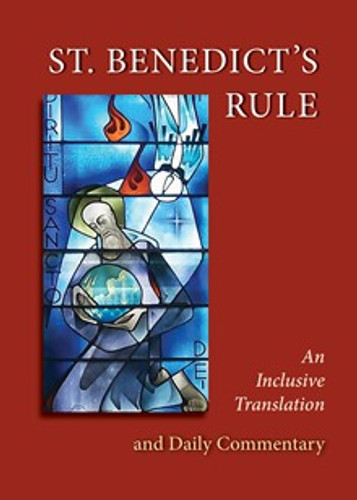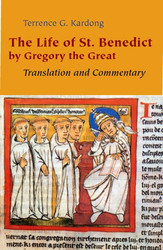The Rule of St. Benedict forms the foundation for one of the oldest ongoing institutions in all of Western civilization. The Rule not only defines life for men and women in monasteries but has also become central to the spirituality of lay Christians across the globe.
This gender-neutral translation is true to the original text but provides an alternative for individuals and groups who prefer such a version over the masculine language of the original as it was written for St. Benedict’s monks. It also offers some background into the context in which it was written, as well as reflections on its meaning for contemporary life, making it a resource for those encountering the Rule for the first time or those who have cherished it for years.
Product Preview
| Format: | Paperback book |
|---|---|
| Product code: | LP8818 |
| Dimensions: | 5" x 7" |
| Length: | 312 pages |
| Publisher: |
Liturgical Press
|
| ISBN: | 9780814688182 |
| 1-2 copies | $21.95 each |
|---|---|
| 3-9 copies | $20.95 each |
| 10-49 copies | $19.96 each |
| 50-99 copies | $19.46 each |
| 100+ copies | $18.71 each |
Praise
A lot of exegetical work was done beforehand, and a wide range of knowledge can be supposed. With joy we dive into this book and finish it being convinced about the value not only of the book but of the life it shows.
Saint Benedict was a sixth-century man who wrote a Rule for monastic men. Some fifteen centuries later there are more Benedictine women than Benedictine men, and the usual reading of the Rule in community needs some adaptation in many situations. Judith Sutera has produced a translation of the Rule that seeks to maintain its meaning and challenge but has replaced gendered vocabulary with more neutral terms. She has produced a flowing translation that will serve the purpose of community reading well. In addition, she has added brief comments and questions to wake up those who are lulled into inattention by the familiarity of the text.
Judith Sutera, OSB, has done the monastic tradition and the Christian Church in general a great service. As each new generation (re-)discovers the Rule of Benedict, not only as a legislative guide for monastic communities but also as a rich document of Christian spirituality, it needs an edition and translation that is relevant to the contemporary cultural context. Sutera's inclusive language edition will likely be the new standard edition for readers of the rule in the English language. Moreover, her concise yet rich and illuminative commentary serves as a more-than-adequate introduction and guide to understanding the mind of Benedict. Accessible and deceptively learned, this book should be the primary textbook for all schools of the Lord's service.
Whether the reader is meeting the Rule of Benedict for the first time, or has lived by its wisdom for decades, Sister Judith's work offers an abundance of tools to listen for God's voice everywhere. The gender-neutral language is fluid, elegant, and timely. The commentary is just the right blend of scholarship, personal reflection from her lived experience, and practical observation that leads to understanding. And Sister Judith's reflection questions cut to the heart of the matter and prompt truthful meditation that is both active and contemplative. This is a treasure I look forward to returning to for years of prayerful rumination.
Without neglecting the experience of those who have long lived it, this is a wonderful introduction to the Rule for those who are new to it. Sr. Judith’s lucid, down-to-earth prose reveals the mysterious profundity of Benedict’s very practical vision of life together.
Sr. Judith’s translation is helpful. Her commentary sheds light on the text, weaving themes together to show connections throughout the Rule. The reflection questions can take one deeper into the text and into relationship with God, self and others. Highly recommended for oblates and all who love and live the monastic way of life.
Sr. Judith Sutera has done a masterful job of making a spiritual classic accessible to everyone who sincerely seeks God. She has provided a gender-neutral translation of the Rule, with a commentary, and something every teacher of the Rule will appreciate, several questions for reflection and discussion after each day’s reading of the Rule. Reading this book, you will come to realize that Sr. Judith is indeed a scholar who loves her life and her vocation. Her heart speaks and calls to us to see what she sees and to name the source of our longing and desire. She teaches us to listen with the ears of our heart and to open our eyes to the light that comes from God.
The beauty and genius of the Benedictine Rule is that while its wisdom is unchanging, its vision is expansive enough to apply to any era. That ability to adapt is what has allowed Benedictine spirituality to endure and thrive through sixteen centuries. With this new commentary, Sister Judith Sutera offers fresh insights into the timeless wisdom of the Rule capable of guiding those of us seeking to live the Benedictine values of listening, community, hospitality, humility, prayer, and work in the twenty-first century.
Sutera’s commentary emphasizes the central elements of the Rule which have made it such a reliable and faithful guide to Gospel life for over 1500 years, not only for monastics but also for the many laity today who depend upon it. Her three questions posed to readers at the end of each segment help make this book a valuable resource for personal meditation.
I was not expecting Judith Sutera's book to be the devotional reader of the Rule of St. Benedict I never knew I needed. Reading the Rule every day is a beloved routine, and there's a scholarly reference edition on my shelf for occasional deeper study, but this book perfectly fills the space between text and textbook. Her daily reflections are genuinely insightful and relevant to me as an oblate, and she provides enough serious questions to reflect upon a different one every day of the year. Judith Sutera's translation of the Rule reads like most modern English texts, it's inclusivity feels natural. I imagine if Benedict had written his Rule today it would have sounded a lot like this.
Sister Judith has given us a great gift—an inclusive translation of the Rule that is accurate, well-written, and illuminated by her perceptive commentary. This Rule will introduce the person who has no real idea of monastic life to the values of its disciplines, particularly silence, humility, and community life lived intentionally. For those who are familiar with the text, it provides new insights and highlights the contrast between Benedict and The Master. The questions after each day’s reading help the reader make the Rule the form of daily life. The perennial wisdom of our Holy Father Benedict, thanks to Sister Judith, is now more accessible and inviting to all.
What makes this book so special, and so useful to the reader, is that every word is informed by Judith Sutera’s lived experience. Her insights have been gleaned from years of monastic formation and living in the rock tumbler of a Benedictine community. The Rule may be Wisdom literature, but it’s also a way of life, and Sister Judith illuminates it in down-to-earth and accessible language.
Sutera’s translation will introduce Benedict to readers who could not image an ancient monastic document might speak to their contemporary lives. For people who have read the Rule many times, Benedict will be heard with fresh clarity. And through the commentary and prayerful questions that apply Benedict’s wisdom to daily life, all of us together will find God’s voice addressing us today.
Well, it’s about time. This is the latest step in the renewal of Rule scholarship since Vatican II, making available the fruits of half a century of labor in translation and critical commentary for daily use in inclusive language. Sr. Judith is a careful writer, choosing her words thoughtfully so that the reader always knows what she is talking about. It is a wonderful gift in these days of vague language when clarification only means turning up the volume. Sr. Judith’s translation is a new vade mecum for Benedictine monastics and oblates of the 21st century.
Her inclusive translation flows beautifully. The reflection questions are the most penetrating, succinct and timely that I have come across.
It is the combination of good scholarship and lived Benedictine experience that makes this resource so useful.
Sutera has done a brilliant job in producing an inclusive translation that sounds both natural and beautiful. She has achieved not only a gender-inclusive translation, but also an inclusive translation in the literary sense, pleasing to both American and British ears. Sister Judith uses the term 'monastics' to describe both monks and nuns and 'superior' to describe abbots and abbesses. She also uses gender-neutral language for priests, recognizing that there are Anglican nuns who are also priests.
22,000 monastics and over 25,000 lay oblates follow St. Benedict’s Rule today—living witness to the viability of this 6th century document. By making its language inclusive, Judith Sutera gives the 21st century greater access to it and opens up new spaces, within and without the monastery, for sharing Benedict’s wisdom.
What Sutera has created is a text that is no longer limited to its masculinized context. This enables the Rule to be read in a world that is unafraid of wholeheartedly embracing the wondrous fluidity of gender. What a gift and a blessing!
Future generations of Benedictines and their friends will not be distracted by exclusive language thanks to Judith Sutera’s translation. Available in two convenient forms, with and without daily commentary, this is a very accessible, welcome resource.
This commentary is recommended for those new to the Rule and desirous to explore its wisdom in relationship to their own living a Christ-centered life more fully. It might also be welcomed by those, who wish for a more inclusive translation.
Sr. Judith Sutera has provided in this book a valuable resource for the monastic and the non-monastic alike. Through it, the words and teachings of Saint Benedict may be understood better by those who have lived as followers of the Rule for a lifetime as well as by those who are just being introduced to it. Her translation and commentary offer a fresh perspective and tool for any monastic seeker, one that can be revisited and utilized for years to come.
This delightful new translation is a good introduction for first-time readers of the Rule and an inspiration for veterans.
Sister Judith Sutera, OSB, has done a great service not only to Benedictine communities of women, but to all who take it as an inspiration and guide for their Christian life, both women and men.
Author
Sister Judith Sutera, OSB, is a member of the Benedictine monastery of Mount St. Scholastica in Atchison, Kansas. One of the first women to receive a master’s degree in monastic theology, she has combined this education with a previous degree in counseling to become a popular writer and presenter for retreats and conferences, bringing Benedictine wisdom to oblates, academics, and religious groups.









